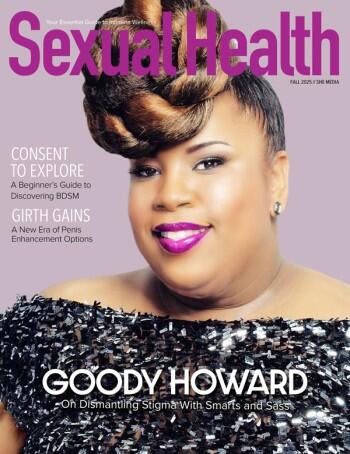Brand visibility is essential for growth. Unfortunately for brands in the sexual wellness industry, the platforms they need to create that visibility are actively working against them. Though the discussion of sexuality has become more mainstream, shadow-banning is still alive and well — especially for female-focused and gender-diverse sexuality brands.
This problem was recently demonstrated when Unbound ran an experiment. The sexual wellness company submitted to Meta a femme-focused ad campaign featuring sex toys, and it was rejected. However, the platform accepted ads featuring the same products when reframed to target a male audience.
Media censorship and the economic limitations it imposes on these organizations threaten to shift female sexual wellness back to being dominated by the male voice, limiting diversity.
As sexual wellness PR and comms experts, we experience the effects of this censorship every single day. Our female-focused sexuality clients are regularly censored, so we must find ways to overcome this obstacle and get them in front of the audiences they strive to serve.
If you are part of a female-focused sexual wellness brand, you need to understand how this active censorship by the media tech platforms limits your brand’s ability to reach your target audience, and what you can do about it.
What Censorship Means for Female-Focused Sexual Wellness Brands
Media censorship of female-focused sexual wellness brands impacts not only the brands themselves, but also the sexual wellness industry as a whole and the general visibility of female-bodied sexual wellness. This impact is both economic and cultural.
Advertising platforms such as Meta offer the greatest potential for reaching your target audience. This makes them growth engines needed to create a successful brand that attracts customers and potential outside funding.
A January 2022 report published by the Center for Intimacy Justice (CIJ) found that 100% of the 60 organizations studied for the report had experienced rejection of their advertisements by Meta platforms. Half of the organizations had their ad accounts suspended by the platform at some point.
All but one of the organizations that participated in the study were female-led, with the one exception being led by a nonbinary person. These organizations represented categories such as menopause, sexual wellness, sexual education, pelvic pain and menstrual health.
By censoring female-focused sexuality brands, Meta and other tech platforms are blocking these brands’ access to their target audience — access that could potentially translate directly and indirectly to millions of dollars.
Female-led organizations also hire women at six times the rate of male-led organizations. Missing out on potential growth due to limited brand visibility translates to brands struggling to provide competitive salaries essential to retaining women and gender-diverse talent.
Cultural Effects
As mentioned, organizations focused on female sexual health, wellness and sexuality are overwhelmingly female-led, creating cultures that are exponentially more inclusive and diverse. Media censorship and the economic limitations it imposes on these organizations threaten to shift female sexual wellness back to being dominated by the male voice, limiting diversity.
The CIJ report and the Unbound experiment clearly show that female-founded and female-focused organizations — the same organizations pushing for the visibility of female-bodied sexuality and sexual wellness — are being cut off from channels of advertising vital to their survival and success. This exposes these organizations to the threat of being eclipsed by more successful, well-funded male-led and male-focused sexual wellness brands, which are now expanding to include female-centered sexual wellness products.
How to Navigate Censorship as a Female-focused Brand
Despite the jarring reports, it’s not all doom and gloom. Censorship of the sexual wellness industry isn’t new, and those who work in it have always found ways to work with current realities. So how do you make sure your brand is visible?
Short answer: get creative. Here are three ways you can beat the algorithms and get in front of your audience.
Learn a New ‘Seggsy’ Language
Do some research on how other brands in the sexual wellness space are speaking about sexual wellness on their social media channels. Female-focused brands are creating new terms and even language around sexuality as workarounds that censors don’t recognize.
Some examples of this are changing the spelling of sex to “s*x” or even “seggs.” On platforms like TikTok, the younger crowd is using the term “mouth fun” to refer to oral sex.
Get in With Influencers
Another solution is star power. For example, OMGYes received a major boost when Emma Watson praised the sex-ed website while using her platform to raise awareness about the importance of female pleasure.
Shoutouts from big celebrities are great, but partnering with micro-influencers can often be even more effective. Though they have smaller audiences, they’ve often invested time building trust and relationships with their followers, increasing the likelihood that they’ll actually buy a product.
Balanced Messaging Is Everything
Central to brand awareness is your messaging. You’ve got to do research into what works for your particular audience. Even if you have to shift how you deliver your message depending on the platform or media you’re using, the messaging has to resonate.
Thanks to increased awareness of how Meta and other media tech platforms censor female-focused sexual wellness brands, policies are starting to shift in the right direction. Hopefully, such bias will become a thing of the past. In the meantime, the information above can help you use your brand voice to break down barriers to female-bodied access to sexual wellness and pleasure.
Kathryn Byberg is the founder and CEO of Little Leaf Agency, a PR and communications agency dedicated to sexual wellness.








